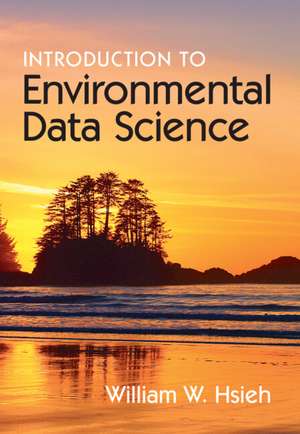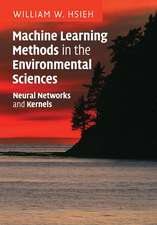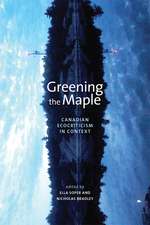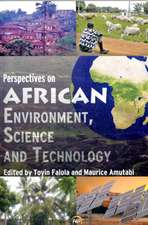Introduction to Environmental Data Science
Autor William W. Hsiehen Limba Engleză Hardback – 22 mar 2023
Preț: 433.76 lei
Preț vechi: 471.47 lei
-8% Nou
Puncte Express: 651
Preț estimativ în valută:
83.00€ • 86.88$ • 69.08£
83.00€ • 86.88$ • 69.08£
Carte disponibilă
Livrare economică 10-24 martie
Livrare express 22-28 februarie pentru 62.14 lei
Preluare comenzi: 021 569.72.76
Specificații
ISBN-13: 9781107065550
ISBN-10: 1107065550
Pagini: 500
Dimensiuni: 175 x 250 x 35 mm
Greutate: 1.34 kg
Editura: Cambridge University Press
Colecția Cambridge University Press
Locul publicării:New York, United States
ISBN-10: 1107065550
Pagini: 500
Dimensiuni: 175 x 250 x 35 mm
Greutate: 1.34 kg
Editura: Cambridge University Press
Colecția Cambridge University Press
Locul publicării:New York, United States
Cuprins
1. Introduction; 2. Basics; 3. Probability distributions; 4. Statistical inference; 5. Linear regression; 6. Neural networks; 7. Nonlinear optimization; 8. Learning and generalization; 9. Principal components and canonical correlation; 10. Unsupervised learning; 11. Time series; 12. Classification; 13. Kernel methods; 14. Decision trees, random forests and boosting; 15. Deep learning; 16. Forecast verification and post-processing; 17. Merging of machine learning and physics; Appendices; References; Index.
Recenzii
'As a new wave of machine learning becomes part of our toolbox for environmental science, this book is both a guide to the latest developments and a comprehensive textbook on statistics and data science. Almost everything is covered, from hypothesis testing to convolutional neural networks. The book is enjoyable to read, well explained and economically written, so it will probably become the first place I'll go to read up on any of these topics.' Alan Geer, European Centre for Medium-Range Weather Forecasts (ECMWF)
'William Hsieh has been one of the 'founding fathers' of an exciting new field of using machine learning (ML) in the environmental sciences. His new book provides readers with a solid introduction to the statistical foundation of ML and various ML techniques, as well as with the fundamentals of data science. The unique combination of solid mathematical and statistical backgrounds with modern applications of ML tools in the environmental sciences … is an important distinguishing feature of this book. The broad range of topics covered in this book makes it an invaluable reference and guide for researchers and graduate students working in this and related fields.' Vladimir Krasnopolsky, Center for Weather and Climate Prediction, NOAA
'Dr. Hsieh is one of the pioneers of the development of machine learning for the environmental sciences including the development of methods such as nonlinear principal component analysis to provide insights into the ENSO dynamic. Dr. Hsieh has a deep understanding of the foundations of statistics, machine learning, and environmental processes that he is sharing in this timely and comprehensive work with many recent references. It will no doubt become an indispensable reference for our field. I plan to use the book for my graduate environmental forecasting class and recommend the book for a self-guided progression or as a comprehensive reference.' Philippe Tissot, Texas A&M University-Corpus Christi
'There is a need for a forward-looking text on environmental data science and William Hsieh's text succeeds in filling the gap. This comprehensive text covers basic to advanced material ranging from timeless statistical techniques to some of the latest machine learning approaches. His refreshingly engaging style is written to be understood and complemented by a plethora of expressive visuals. Hsieh's treatment of nonlinearity is cutting-edge and the final chapter examines ways to combine machine learning with physics. This text is destined to become a modern classic.' Sue Ellen Haupt, National Center for Atmospheric Research
'William Hsieh has been one of the 'founding fathers' of an exciting new field of using machine learning (ML) in the environmental sciences. His new book provides readers with a solid introduction to the statistical foundation of ML and various ML techniques, as well as with the fundamentals of data science. The unique combination of solid mathematical and statistical backgrounds with modern applications of ML tools in the environmental sciences … is an important distinguishing feature of this book. The broad range of topics covered in this book makes it an invaluable reference and guide for researchers and graduate students working in this and related fields.' Vladimir Krasnopolsky, Center for Weather and Climate Prediction, NOAA
'Dr. Hsieh is one of the pioneers of the development of machine learning for the environmental sciences including the development of methods such as nonlinear principal component analysis to provide insights into the ENSO dynamic. Dr. Hsieh has a deep understanding of the foundations of statistics, machine learning, and environmental processes that he is sharing in this timely and comprehensive work with many recent references. It will no doubt become an indispensable reference for our field. I plan to use the book for my graduate environmental forecasting class and recommend the book for a self-guided progression or as a comprehensive reference.' Philippe Tissot, Texas A&M University-Corpus Christi
'There is a need for a forward-looking text on environmental data science and William Hsieh's text succeeds in filling the gap. This comprehensive text covers basic to advanced material ranging from timeless statistical techniques to some of the latest machine learning approaches. His refreshingly engaging style is written to be understood and complemented by a plethora of expressive visuals. Hsieh's treatment of nonlinearity is cutting-edge and the final chapter examines ways to combine machine learning with physics. This text is destined to become a modern classic.' Sue Ellen Haupt, National Center for Atmospheric Research
Notă biografică
Descriere
A comprehensive guide to machine learning and statistics for students and researchers of environmental data science.
















